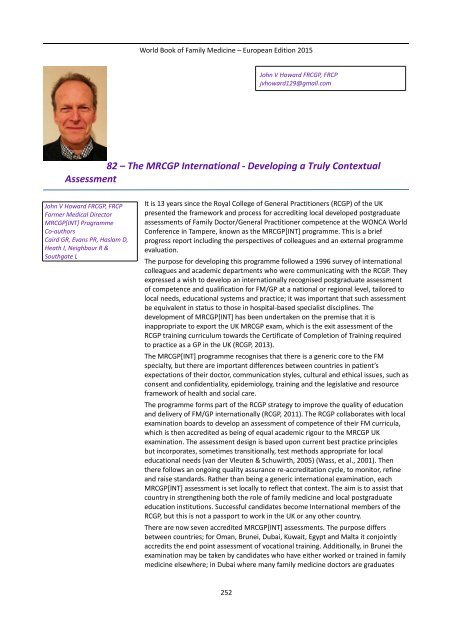Family Medicine
World Book 2015
World Book 2015
You also want an ePaper? Increase the reach of your titles
YUMPU automatically turns print PDFs into web optimized ePapers that Google loves.
World Book of <strong>Family</strong> <strong>Medicine</strong> – European Edition 2015<br />
John V Howard FRCGP, FRCP<br />
jvhoward129@gmail.com<br />
82 – The MRCGP International - Developing a Truly Contextual<br />
Assessment<br />
John V Howard FRCGP, FRCP<br />
Former Medical Director<br />
MRCGP[INT] Programme<br />
Co-authors<br />
Caird GR, Evans PR, Haslam D,<br />
Heath I, Neighbour R &<br />
Southgate L<br />
It is 13 years since the Royal College of General Practitioners (RCGP) of the UK<br />
presented the framework and process for accrediting local developed postgraduate<br />
assessments of <strong>Family</strong> Doctor/General Practitioner competence at the WONCA World<br />
Conference in Tampere, known as the MRCGP[INT] programme. This is a brief<br />
progress report including the perspectives of colleagues and an external programme<br />
evaluation.<br />
The purpose for developing this programme followed a 1996 survey of international<br />
colleagues and academic departments who were communicating with the RCGP. They<br />
expressed a wish to develop an internationally recognised postgraduate assessment<br />
of competence and qualification for FM/GP at a national or regional level, tailored to<br />
local needs, educational systems and practice; it was important that such assessment<br />
be equivalent in status to those in hospital-based specialist disciplines. The<br />
development of MRCGP[INT] has been undertaken on the premise that it is<br />
inappropriate to export the UK MRCGP exam, which is the exit assessment of the<br />
RCGP training curriculum towards the Certificate of Completion of Training required<br />
to practice as a GP in the UK (RCGP, 2013).<br />
The MRCGP[INT] programme recognises that there is a generic core to the FM<br />
specialty, but there are important differences between countries in patient’s<br />
expectations of their doctor, communication styles, cultural and ethical issues, such as<br />
consent and confidentiality, epidemiology, training and the legislative and resource<br />
framework of health and social care.<br />
The programme forms part of the RCGP strategy to improve the quality of education<br />
and delivery of FM/GP internationally (RCGP, 2011). The RCGP collaborates with local<br />
examination boards to develop an assessment of competence of their FM curricula,<br />
which is then accredited as being of equal academic rigour to the MRCGP UK<br />
examination. The assessment design is based upon current best practice principles<br />
but incorporates, sometimes transitionally, test methods appropriate for local<br />
educational needs (van der Vleuten & Schuwirth, 2005) (Wass, et al., 2001). Then<br />
there follows an ongoing quality assurance re-accreditation cycle, to monitor, refine<br />
and raise standards. Rather than being a generic international examination, each<br />
MRCGP[INT] assessment is set locally to reflect that context. The aim is to assist that<br />
country in strengthening both the role of family medicine and local postgraduate<br />
education institutions. Successful candidates become International members of the<br />
RCGP, but this is not a passport to work in the UK or any other country.<br />
There are now seven accredited MRCGP[INT] assessments. The purpose differs<br />
between countries; for Oman, Brunei, Dubai, Kuwait, Egypt and Malta it conjointly<br />
accredits the end point assessment of vocational training. Additionally, in Brunei the<br />
examination may be taken by candidates who have either worked or trained in family<br />
medicine elsewhere; in Dubai where many family medicine doctors are graduates<br />
252


